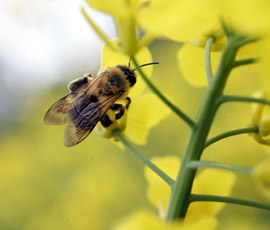UK bee risk field study flawed, EFSA says

Scientists at the European Food Safety Agency (EFSA) have identified “several weaknesses” in a UK government study which suggested neonicotinoid pesticides did not have a major effect on bee health.
DEFRA published field research – Effects of neonicotinoid seed treatments on bumblebee colonies under field conditions (Thompson et al) – in March.
The Food and Environment Research Agency (FERA) study established that when used under field conditions within a normal agricultural setting neonicotinoids did not have a major effect on bumblebee colonies.
DEFRA secretary Owen Paterson used the study as evidence to support the UK’s decision to vote against the EU’s proposal to partially ban neonicotionids in the European Council in April.
But after reviewing the study, EFSA said the weaknesses it had identified would not alter EU-wide restrictions on three neonicotinoids from December – clothianidin, thamethoxam and imidacloprid – for use on crops that are attractive to bees and pollinators, such as oilseed rape, sunflowers and maize.
“The FERA study looked at only one crop, oilseed rape, and two plant protection products – one containing clothianidin, the other imidacloprid – authorised for use in the UK,” said EFSA.
“Furthermore, the test sites and surrounding areas used in the FERA study reflect a small sample of agricultural conditions in the UK and cannot be considered representative of conditions in other parts of the EU.”
EFSA, the EU’s independent food safety agency, said the study also failed to address two important routes of exposure – dust and guttation.
In its assessments, EFSA reached conclusions mainly for honeybees, and identified a data gap for other pollinators.
“Field studies of bumblebees cannot be used to understand the risks to honey bees and other pollinators because of significant species differences,” it added.
EFSA’s experts highlighted a number of other deficiencies in the report. These include:
- Inconsistencies and contradictory statements regarding the objectives of the study.
- Absence of suitable control bee colonies. In particular, analysis of residues in pollen and nectar showed that the “control” site had been contaminated by thiamethoxam.
- Environmental conditions were varied across the three the test sites, which reduces the sensitivity of the study in detecting effects on colonies.
EFSA also raised concerns about how the authors of the report, Thompson et al, elaborated and interpreted the study to reach their conclusions.
A DEFRA spokesperson said: “Having a healthy bee population is a top priority for us but we did not support the proposal for a ban because scientific evidence doesn’t support it.
“Significant countries agree with us that introducing a ban was not the right action to take and we will work with these countries to get much better evidence. We will work with farmers to cope with the consequences as a ban will carry significant costs for them.”

